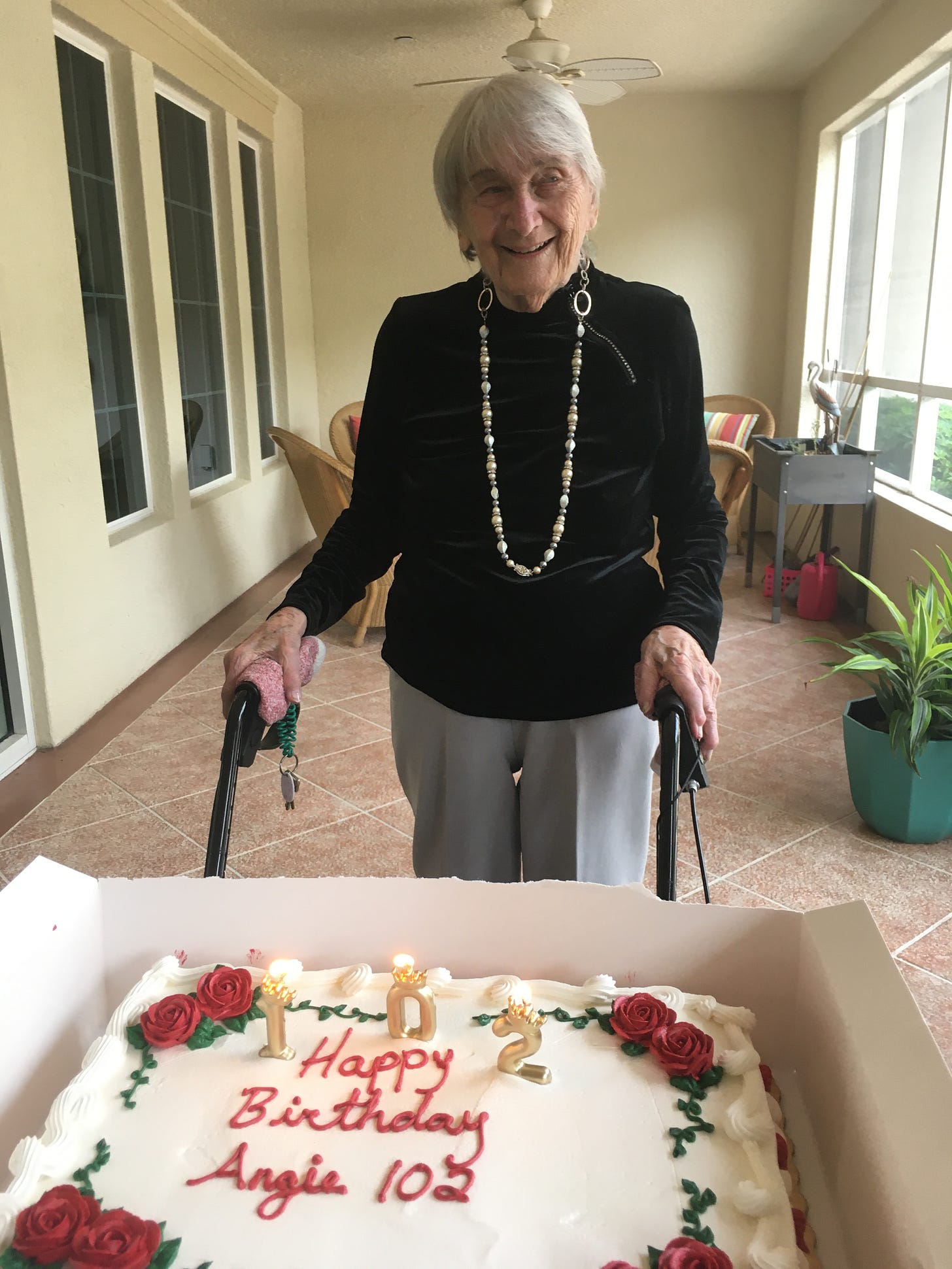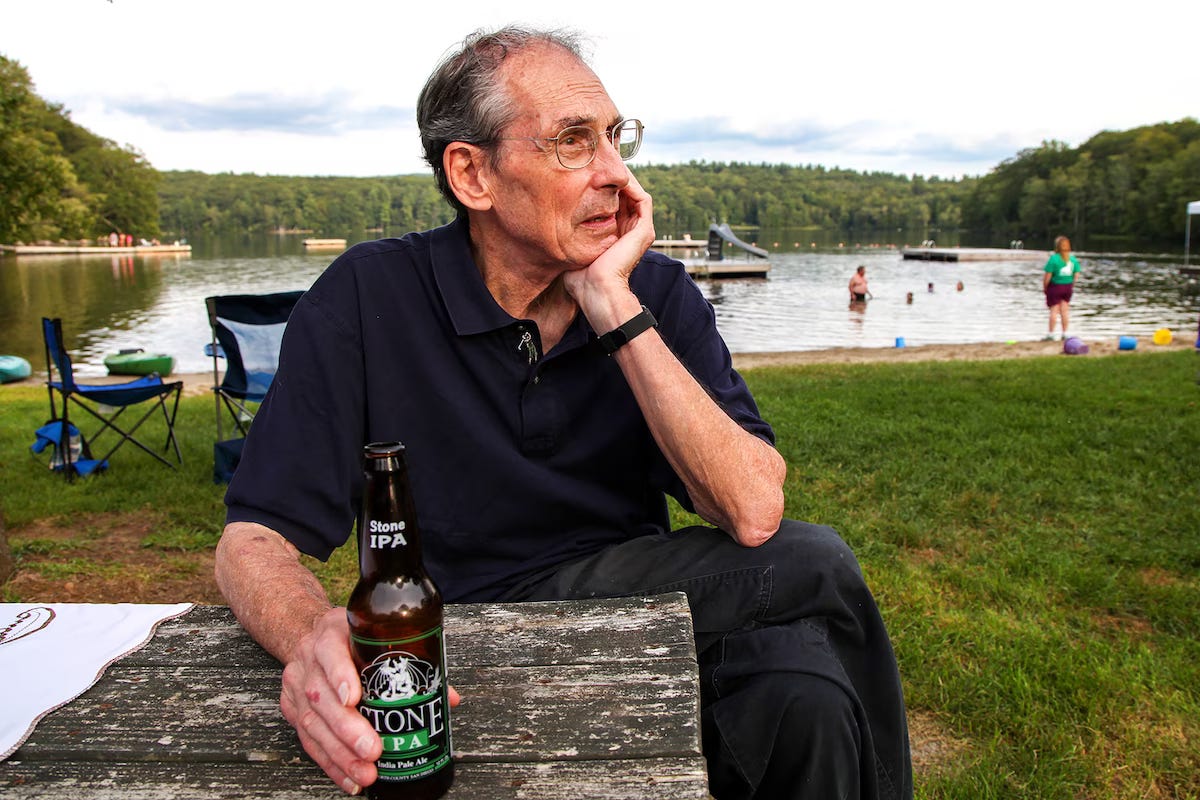Milestones: Angela Zerad Begins Her 103rd Year
In an eventful week, one celebration and three commemorations.
The birthday girl today in Venice, Florida. (Photo by Susan Garau.)
Two years ago, when Angela Zerad turned 100, I noted the event with a portrait of her with her two daughters: Susan Zerad Garau, of Rome, and Deborah Zerad Fallows, of Washington DC.
Today Angie turned 102 and rang in her 103rd year as she has most previous years, by giving a piano recital. She has been an accomplished pianist since childhood, and she performs for nearly an hour every day at her assisted living facility in Venice, Florida.
Happy Birthday, Angie! You are an inspiration, joy, and example to us all.
This past week has included sadder milestones, including the passing of Rosalynn Carter, known to the world, and Charles Peters, known to the world of journalism and government.
There is one other such loss I want to note as part of this week’s record. At the start of this week, the talented and bravely principled writer Jerome Doolittle, known to his friends as Jerry, died at age 90, in Connecticut.
Jerry Doolittle in his home town of West Cornwall, Connecticut, in 2012. (Photo by Don Heiny, courtesy of Michael Doolittle.)
I met Jerry Doolittle back in 1976, when we both were working on the Jimmy Carter presidential campaign. After Carter won, we worked together on Carter’s White House speechwriting team, a role that was only one stop in Jerry’s polymath career.
Jerry was in his early 40s when he began working for Carter. Before that he had been a satirical writer for The Washington Post and other publications, and had gotten afoul of authorities—a recurring pattern—when writing for a military paper while in the Army. A profile of Jerry by Teresa Johnson in the Harvard Crimson in 1986, when Jerry was teaching writing there, told the story this way:
Doolittle didn't like the army very much, and he says he made that clear in the newspaper. In one issue, the first letters of the column filler he wrote spelled out an obscene message. The issue sold out in 20 minutes, he says, but he was almost brought up on charges. The thing that saved him was his last name—“they were afraid I might be related to General Doolittle,” he says, referring to the American war hero who led an infamous air raid against the Japanese.
Jerry was not related to the general.
In his 30s, Jerry had joined the State Department and worked at the US Embassy in Laos. In another recurring pattern, he stood up against lies and fraud in public life. During one of the Nixon bombing campaigns on Cambodia in 1973, the New York Times ran an op-ed by him that showed his principled clarity of expression and thought:
WEST CORNWALL, Conn. — The Pentagon's most recent lies about bombing Cambodia bring back a question that often occurred to me when I was press attaché at the American Embassy in Vientiane, Laos.
Why did we bother to lie?
When I first arrived in Laos, I was instructed to answer all press questions about our massive and merciless bombing campaign in that tiny country with: “At the request of the Royal Laotian Government, the United States Is conducting unarmed reconnaissance flights accompanied by armed escorts who have the right to return fire If fired upon.”
This was a lie. Every reporter to whom I told it knew it was a lie. The Communist Pathet Lao knew it was a lie. Hanoi knew it was a lie. The International Control Commission knew. It was a lie. Every interested Congressman and newspaper reader knew it was a lie…
Why, then, did we bother to tell it?
He went on to explain why and how.
Less than four years later, this same Jerry Doolittle was the main writer on what I consider the best speech of Jimmy Carter’s presidency. That was the commencement address at Notre Dame, in which Carter laid out his case for emphasizing human rights in US foreign policy.
Within a few years after that, Jerry had written a powerful novel about the secret war in Laos; kicked off an excellent series of crime novels; continued writing natural-history and environmental works; and become a popular writing teacher at Harvard. “There are depressingly few poor attitudes here,” Jerry told the Crimson. He prided himself on “poor attitude” as his lifelong trait, starting with when “attitude” got him kicked out of prep school. “If I were the admissions office, I would make sure that some people had poor attitudes. Good grades in high school can be a possible indication of a basic flaw."
And I’m not even going into Jerry’s best known and most thankless labor: that of lead joke writer for Jimmy Carter’s “humorous” presentations, at the White House Correspondents’ Dinner and similar ordeals.
I don’t need to go into it because it’s one of many aspects of Jerry’s career that Brian Murphy of the Washington Post covers in a marvelous appreciation, here. Congratulations to Murphy on a tone and presentation so well matched to the subject’s style and flair.
I admired and relied on Jerry during our time in the White House. I considered him a dear friend in the succeeding years.
Condolences to his family and his many friends. Please read Brian Murphy’s article, or the Crimson profile, or any of Jerry’s “Tom Bethany” crime novels for more.
As we end this Thanksgiving week, congratulations again to Angie Zerad, and gratitude for the very different contributions of those we have lost.






What an unexpected pleasure (though tempered by the reason for its appearance) to see the appreciation for Jerry Doolittle.
Mr. Doolittle (I can still recall the somewhat exasperated snort he let out when someone addressed him as Professor Doolittle on the first day of class) was my expos teacher in the fall of 1985. While I am not a person who generally lacks for confidence, I was coming to Harvard from a California high school that (at that time at least) didn't send many kids to the Ivy League. So I remember wondering if I would have to change the way I wrote to succeed in college.
Mr. Doolittle quickly assuaged those fears. He made it clear that there was no mystery to being a good writer. It was about having something to say and then saying it with clarity and conviction. And as someone who was interested in the idea of national service (and would go on to write my thesis about it), I still remember the anger he held toward the peace protesters of the 60s who had treated military personnel with disdain. He firmly believed that if there hadn't been student exemptions and everyone had served, the Vietnam War would have ended far earlier.
It's been awhile since I thought of Mr. Doolittle, but he was one of only a small handful of teachers at Harvard that actually made an impact on me. Thank you for sharing your memories of him and for the links to the Brian Murphy article and Crimson profile.
Jim I find obituaries a marvelous way to learn fascinating aspects of individuals, both distinguished and just plain interesting.
The New York Times over the years has developed the art of obituary writing. I have learned of the multi-dimensionality of folks who I thought I had known well.
Warm thanks for introducing me to Angela and Jerry.
Now that I am 90 my wife thought that I should write my own obituary. AWWWRK! I would much prefer to read what others will write about me. I imagine that it might be nice, but not especially true. Fortunately I shan’t be scrutinized by NYT obituary specialists.